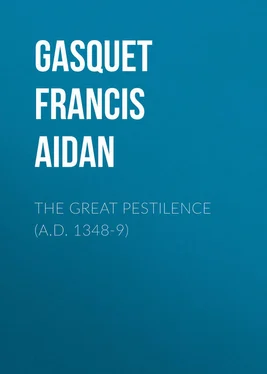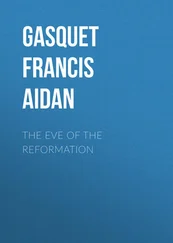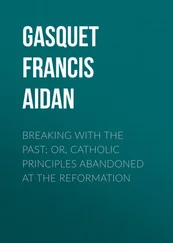Francis Gasquet - The Great Pestilence (A.D. 1348-9)
Здесь есть возможность читать онлайн «Francis Gasquet - The Great Pestilence (A.D. 1348-9)» — ознакомительный отрывок электронной книги совершенно бесплатно, а после прочтения отрывка купить полную версию. В некоторых случаях можно слушать аудио, скачать через торрент в формате fb2 и присутствует краткое содержание. Жанр: foreign_antique, foreign_prose, на английском языке. Описание произведения, (предисловие) а так же отзывы посетителей доступны на портале библиотеки ЛибКат.
- Название:The Great Pestilence (A.D. 1348-9)
- Автор:
- Жанр:
- Год:неизвестен
- ISBN:нет данных
- Рейтинг книги:5 / 5. Голосов: 1
-
Избранное:Добавить в избранное
- Отзывы:
-
Ваша оценка:
- 100
- 1
- 2
- 3
- 4
- 5
The Great Pestilence (A.D. 1348-9): краткое содержание, описание и аннотация
Предлагаем к чтению аннотацию, описание, краткое содержание или предисловие (зависит от того, что написал сам автор книги «The Great Pestilence (A.D. 1348-9)»). Если вы не нашли необходимую информацию о книге — напишите в комментариях, мы постараемся отыскать её.
The Great Pestilence (A.D. 1348-9) — читать онлайн ознакомительный отрывок
Ниже представлен текст книги, разбитый по страницам. Система сохранения места последней прочитанной страницы, позволяет с удобством читать онлайн бесплатно книгу «The Great Pestilence (A.D. 1348-9)», без необходимости каждый раз заново искать на чём Вы остановились. Поставьте закладку, и сможете в любой момент перейти на страницу, на которой закончили чтение.
Интервал:
Закладка:
De' Mussi then proceeds to give examples of the scenes daily passing before his eyes in the plague-stricken cities of northern Italy. The sick man lay languishing alone in his house and no one came near him. Those most dear to him, regardless of the ties of kindred or affection, withdrew themselves to a distance; the doctor did not come to him, and even the priest with fear and trembling administered the Sacraments of the Church. Men and women, racked with the consuming fever, pleaded – but in vain – for a draught of water, and uselessly raved for someone to watch at their bedside. The father or the wife would not touch the corpse of child or husband to prepare it for the grave, or follow it thither. No prayer was said, nor solemn office sung, nor bell tolled for the funeral of even the noblest citizen; but by day and night the corpses were borne to the common plague-pit without rite or ceremony. The doors of the houses now desolate and empty remained closed, and no one cared, nor, indeed, dared to enter.
Such is the picture of the effect of the malady and the terrible mortality caused by it drawn by one who seems to have seen its first introduction into Italy, and who certainly had the best opportunity of early observing its rapid progress. It might, perhaps, be thought that his description of the horrors of the infected cities was over-coloured and the creation of his imagination. But in the details it bears on the surface the stamp of truth, and in its chief characteristics it is confirmed by too many independent witnesses in other parts of Italy, and even in Europe generally, to leave a doubt that it corresponded to the literal reality.
What happened at Florence is well-known through the graphic description of Boccaccio. So terrible was the mortality in that prosperous city that the very outbreak became for a time known in Europe as the "Pestilence of Florence." In the spring of the previous year (1347) a severe famine had been experienced, and some 94,000 people had been in receipt of State relief, whilst about 4,000 are supposed to have perished of starvation in the city 23 23 Sismondi, Histoire des Républiques Italiennes du Moyen Age , vi, p. 11.
and its neighbourhood. The people, enfeebled by previous hardships, would naturally fall a prey more easily to the poison of the epidemic. In April, 1348, the dreaded infection began to show itself. "To cure the malady," writes Boccaccio, "neither medical knowledge nor the power of drugs was of any avail, whether because the disease was in its own nature mortal, or that the physicians (the number of whom – taking quacks and women pretenders into account – was grown very great) could form no just idea of the cause, nor consequently ground a true method of cure; of those attacked few or none escaped, but they generally died the third day from the first appearance of the symptoms, without a fever or other form of illness manifesting itself. The disease was communicated by the sick to those in health and seemed daily to gain head and increase in violence, just as fire will do by casting fresh fuel on it. The contagion was communicated not only by conversation with those sick, but also by approaching them too closely, or even by merely handling their clothes or anything they had previously touched.
"What I am going to relate is certainly marvellous, and, had I not seen it with my own eyes, and were there not many witnesses to attest its truth besides myself, I should not venture to recount it, whatever the credit of persons who had informed me of it. Such, I say, was the deadly character of the pestilential matter, that it passed the infection not only from man to man; but, what is more wonderful, and has been often proved, anything belonging to those sick with the disease, if touched by any other creature, would certainly affect and even kill it in a short space of time. One instance of this kind I took special note of, namely, the rags of a poor man just dead having been thrown into the street, two hogs came by at the time and began to root amongst them, shaking them in their jaws. In less than an hour they fell down and died on the spot.
"Strange were the devices resorted to by the survivors to secure their safety. Divers as were the means, there was one feature common to all, selfish and uncharitable as it was – the avoidance of the sick, and of everything that had been near them; men thought only of themselves.
"Some held it was best to lead a temperate life and to avoid every excess. These making up parties together, and shutting themselves up from the rest of the world, ate and drank moderately of the best, diverting themselves with music and such other entertainments as they might have at home, and never listening to news from without which might make them uneasy. Others maintained that free living was a better preservative, and would gratify every passion and appetite. They would drink and revel incessantly in tavern after tavern, or in those private houses which, frequently found deserted by the owners, were therefore open to anyone; but they yet studiously avoided, with all their irregularity, coming near the infected. And such at that time was the public distress that the laws, human and divine, were not regarded, for the officers to put them in force being either dead, sick, or without assistants, everyone did just as he pleased."
Another class of people chose a middle course. They neither restricted themselves to the diet of the former nor gave way to the intemperance of the latter; but eating and drinking what their appetites required, they went about everywhere with scents and nosegays to smell at, since they looked upon the whole atmosphere as tainted with the effluvia arising from the dead bodies.
"Others, again, of a more callous disposition declared, as perhaps the safest course in the extremity, that the only remedy was in flight. Persuaded, therefore, of this, and thinking only of themselves, great numbers of men and women left the city, their goods, their house, and kindred, and fled into the country parts; as if the wrath of God had been restricted to a visitation of those only within the city walls, and hence none should remain in the doomed place.
"But different as were the courses pursued, the sickness fell upon all these classes without distinction; neither did all of any class die, nor did all escape; and they who first set the example of forsaking others now languished themselves where there was no one to take pity on them. I pass by the little regard that citizens and distant relations showed one to the other, for the terror was such that brother even fled from brother, wife from husband, nay, the parent from her own child. The sick could obtain help only from the few who still obeyed the law of charity, or from hired servants who demanded extravagant wages and were fit for little else than to hand what was asked for, and to note when the patient died. Even such paid helpers were scarce, and their desire of gain frequently cost them their lives. The rich passed out of this world without a single person to aid them; few had the tears of friends at their departure. The corpse was attended to the grave only by fellows hired for the purpose, who would put the bier on their shoulders and hurry with it to the nearest church, where it was consigned to the tomb without any ceremony whatever, and wherever there was room.
"With regard to the lower classes, and, indeed, in the case of many of the middle rank of life, the scenes enacted were sadder still. They fell sick by thousands, and, having no one whatever to attend them, most of them died. Some breathed their last in the streets, others shut up in their own houses, when the effluvia which came from their corpses was the first intimation of their deaths. An arrangement was now made for the neighbours, assisted by such bearers as they could get, to clear the houses, and every morning to lay the bodies of the dead at their doors. Thence the corpses were carried to the grave on a bier, two or three at a time. There was no one to follow, none to shed tears, for things had come to such a pass that men's lives were no more thought of than those of beasts. Even friends would laugh and make themselves merry, and women had learned to consider their own lives before everything else.
Читать дальшеИнтервал:
Закладка:
Похожие книги на «The Great Pestilence (A.D. 1348-9)»
Представляем Вашему вниманию похожие книги на «The Great Pestilence (A.D. 1348-9)» списком для выбора. Мы отобрали схожую по названию и смыслу литературу в надежде предоставить читателям больше вариантов отыскать новые, интересные, ещё непрочитанные произведения.
Обсуждение, отзывы о книге «The Great Pestilence (A.D. 1348-9)» и просто собственные мнения читателей. Оставьте ваши комментарии, напишите, что Вы думаете о произведении, его смысле или главных героях. Укажите что конкретно понравилось, а что нет, и почему Вы так считаете.












